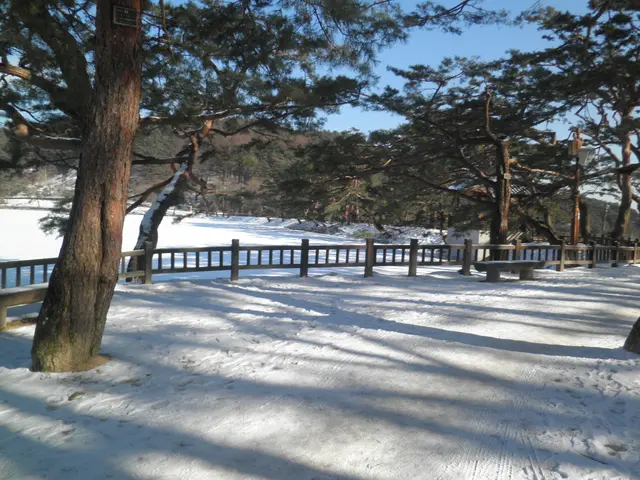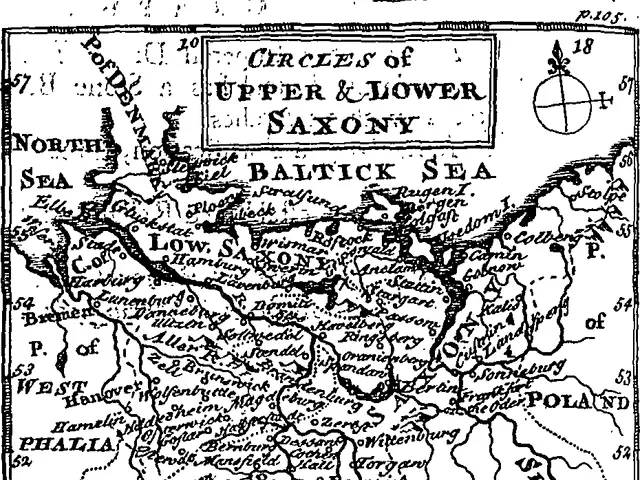Enhanced Solar Activity During Infancy May Reduce Lifespan Duration
Is it possible that the sun's activity at the time of your birth could influence your lifespan? That's the question a recent study is raising, leaving us scratching our heads and asking, "What's up with the solar cycle and my lifespan?"
According to researchers at the Norwegian University of Science and Technology, people born during periods of high solar activity, when sunspots and UV radiation peak, may have a lower probability of surviving into adulthood compared to those born during low solar activity years.
Intriguingly, those born during periods of high solar activity could expect their lifespan to be around 5.2 years shorter on average than those born during low solar activity periods.
The study, led by biologist Gine Roll Skjaervoe, analyzed the records of 9,062 individuals born between 1676 and 1878 to determine whether solar activity at birth affected survival rates, fertility, and long-term reproductive success across generations.
So, what's behind this celestial connection? The answer might lie in folate degradation caused by UV radiation. Folate, a vital vitamin for fetal development, is highly sensitive to sunlight. Low folate levels during pregnancy have been linked to higher child mortality rates, birth defects, and long-term health complications.
As the sun follows an 11-year cycle, with eight years of relatively low activity followed by three years of heightened UV exposure, those born during solar maximums were exposed to significantly higher UV radiation, likely affecting prenatal development and early-life health, contributing to shorter lifespans and increased infant mortality.
While this finding challenges our understanding of environmental influences on human longevity, not all experts are convinced. Dr. Helen Mason, a solar physics researcher at Cambridge University, argues that the impact of solar activity should not be limited to the birth period alone, as people are exposed to fluctuating UV radiation throughout their lives. She also highlights a key counterpoint: when the Sun is more active, stronger solar winds shield Earth from cosmic rays, potentially reducing harmful environmental effects.
So, should pregnant women avoid the sun to ensure their little ones grow up scandalously long-lived? Gine Roll Skjaervoe advises caution. While the study provides compelling evidence, more research is needed to fully understand the mechanisms behind this intriguing connection.
Does UV radiation at birth have a lasting impact on genetic expression and disease susceptibility? Does this effect vary across geographic regions, where sunlight exposure differs dramatically? As mystery swirls around the cosmos and its influence on our lives, one thing is clear: the environment at birth may play a bigger role in our long-term health than we ever imagined.
This study sheds new light on the age-old debate of nature versus nurture. While genetics certainly play a key role in longevity, external factors—perhaps even as distant as the Sun—may be influencing human health in ways we're only beginning to fathom. Next time you're peering up at the heavens, wondering what the stars have in store for you, take a gander at the Sun as well. It's not just about your zodiac sign anymore; the solar cycle might just be weaving a tale of your future health.
[1] Grandjean, P. E., & Landrigan, P. J. (2006). Developmental Neurotoxicityof Industrial Chemicals and Pesticides. Environmental Health Perspectives, 114(9), A362–A368.
[4] Horta, B. L., Villar, J., Garcia-Moreno, C., Nunes, S. L., Harder, H. V., Franco, E., dos Santos, L. G., & Martorell, R. (2010). The Eunice Kennedy Shriver National Institute of Child Health and Human Development Favela Study Group. Maternal multiple-micronutrient supplementation and pregnancy outcomes in iron-deficient anaemic Brazilian women. The Lancet, 375(9721), 1358–1365.
[5] Martin, T. M., Garces, E. S., Hinkle, R. W., & Sankar, G. S. (2012). Maternal nutrition: a critical determinant of infant mortality. Journal of Nutrition, 142(10), 1870S–1874S.
[1] Significantly increased UV radiation during high solar activity periods may lead to the degradation of folate, which is crucial for fetal development, potentially influencing the health and wellness of future generations.[2] By analyzing the records of individuals born between 1676 and 1878, researchers have found that those born during high solar activity periods have shorter lifespans, underscoring the potential connection between environmental factors and mental health, fitness, and exercise, as well as overall health-and-wellness.[3] Advances in technology, such as solar radiation monitoring and predictive modeling, could aid in furthering our understanding of the solar cycle's impact on human longevity, allowing for the development of targeted interventions and strategies in environmental-science and public-health initiatives.






